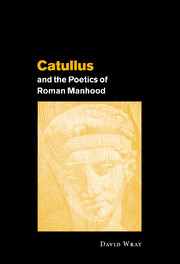3 - Manhood and Lesbia in the shorter poems
Published online by Cambridge University Press: 08 October 2009
Summary
ἀνώνυμοζ τυγΧάνει οὖσα μέΧρι τοῦ νῦν
Aristotle, Poetics 1449b(“[The object of poetics] remains nameless to date”.)
THE OBJECT OF CATULLAN POETICS
It still remains to show in what sense Catullus' text embodies a Herzfeldian “poetics of manhood.” We might begin with its un-mistakably positive aesthetic valuation of the extraordinary and the conspicuous as evidenced in hyperbolic claims whose “very outrageousness carries a revelatory kind of conviction.” Performatively outrageous claims about self and other could plausibly be called a defining feature of the poems. Most of these claims are centered around the appetites and senses of the speaker or inter-locutor's body. At times the object of performance is a refined aesthetic connoisseurship, as when Catullus pronounces an ointment's fragrance so fine that it will make Fabullus wish himself “all nose” (Poem 13), or complains that his life is in danger from the effect of a book of bad poems he has received as a Saturnalia gag gift from Calvus (Poem 14). Elsewhere it is the Catullan speaker's own insatiable appetites, whether oral (as in Poem 7's self-avowedly “mad” hunger for a series of infinitudes of kisses) or genital (as in Poem 32's notice served on Ipsitilla that she prepare herself for nine copulations without a pause). Even the frustration or mortification of an appetite is thrown into the relief of performative excess, as when Catullus, having stolen a single kiss from the boy Juventius, describes himself “hung high upon a cross for more than a whole hour” (99.3–4), weeping and pleading while the boy washes Catullus' kiss off his lips as though it were the “foul spittle of a wolf that smelled of piss” (99.10).
- Type
- Chapter
- Information
- Catullus and the Poetics of Roman Manhood , pp. 64 - 112Publisher: Cambridge University PressPrint publication year: 2001



